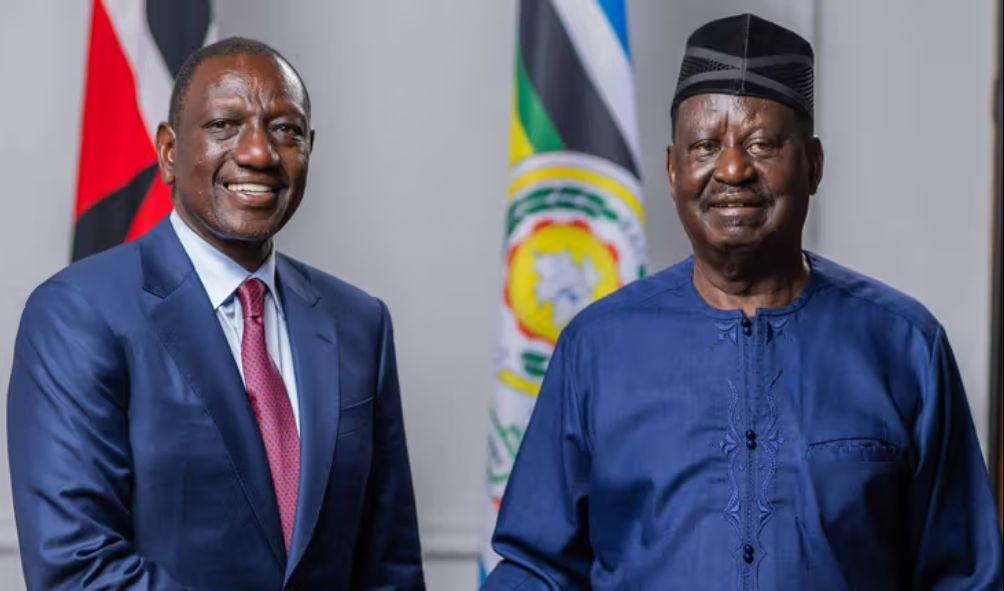Raila Odinga’s Bid for AUC Chair: Potential Earnings Outshine President Ruto’s Salary
Former Prime Minister Raila Odinga could secure a lucrative salary and benefits package if he is elected as the Chairperson of the African Union Commission (AUC).
Kenya officially launched Odinga’s campaign during a ceremony at State House in Nairobi on Tuesday, attended by various presidents and former heads of state.
Salary and Benefits
If Odinga wins the position, his monthly salary will be around Sh2 million ($15,576.75), matching what the current chairperson, Moussa Faki Mahamat, has earned since 2017.
Along with his salary, Odinga will be eligible for several additional perks.
Child Allowance: A monthly allowance of $250 (about Sh32,187) for each eligible child.
Rental Budget: A monthly budget of $6,000 (Sh772,500) for housing and utilities.
Education Benefits: The AUC will cover 100% of school fees for dependent children studying in Africa, and up to $15,000 (around Sh1.9 million) annually if they study in Europe or North America.
Spousal Allowance: Odinga’s wife, Ida, would receive a monthly allowance equivalent to 5% of his basic salary, provided her earnings do not exceed $500 (Sh64,375) per month. This allowance would amount to approximately $778 (Sh100,167).
ALSO READ:
- “Two Groups, One Agenda”: Gachagua Accuses Raila of Secret Political Deals
- Exclusive: Ida Odinga’s 75th Birthday Party in Karen (Photos)
- FKF President Discloses Exact Amount Paid to Harambee Stars Players
- Gachagua’s Ally Senator John Methu Admits Ruto Might Win 2027 Elections
- Maraga Explains Why He Hasn’t Campaigned in Kisii Despite 2027 Bid
President Ruto’s Salary
Raila’s potential earnings as AUC Chairperson could surpass the salary of President William Ruto.
President Ruto’s salary includes a basic monthly salary of Sh866,250, a housing allowance of Sh350,000, and a salary market adjustment of Sh227,500.
This totals a gross monthly income of Sh1,443,750 ($10,873), which is approximately Sh500,000 less than what Raila could earn as AUC Chairperson.
Differences Between the African Union and African Union Commission
Raila Odinga is campaigning to become the next Chairperson of the African Union Commission (AUC), and it’s essential to differentiate between the AU and the AUC.
African Union (AU)
The African Union is a continental organization with 55 member states, established in 2002 as a successor to the Organisation of African Unity (OAU), which existed from 1963 to 1999.
The AU aims to promote unity among African states, coordinate development efforts, protect sovereignty, and eradicate colonialism and apartheid remnants.
Key decision-making bodies include:
- Assembly of Heads of State and Government: The highest decision-making authority.
- Executive Council: Composed of ministers from member states.
- Peace and Security Council: Responsible for conflict prevention and resolution.
- Specialised Technical Committees: Focus on sectors like health, education, and infrastructure.
African Union Commission (AUC)
The AUC serves as the AU’s secretariat, handling its day-to-day operations. Based in Addis Ababa, Ethiopia, it is led by a Chairperson, a Deputy Chairperson, and eight commissioners, all elected for four-year terms, renewable once.
The AUC’s main responsibilities include:
- Representing the AU and defending its interests.
- Proposing initiatives and implementing AU decisions.
- Managing the AU’s budget and resources.
- Coordinating programs and policies with regional economic communities.
- Ensuring gender mainstreaming across initiatives.
The AUC functions as the operational arm of the AU, ensuring communication and collaboration among member states and executing the AU’s strategic objectives.
Key Differences
Nature and Structure: The AU is a political body made up of member states, while the AUC is an administrative body executing the AU’s decisions and overseeing daily operations.
Leadership: The AU’s highest organ is the Assembly of Heads of State and Government, led by a chairperson with a one-year renewable term. The AUC is led by a Chairperson and Deputy Chairperson, with commissioners serving four-year terms, renewable once.
Functions: The AU focuses on political decisions and regional strategies, while the AUC is responsible for implementing these strategies and coordinating activities among member states.
In essence, the African Union sets the continent’s strategic direction, while the African Union Commission manages the operations to ensure these objectives are effectively met.
Raila Odinga’s Bid for AUC Chair: Potential Earnings Outshine President Ruto’s Salary
